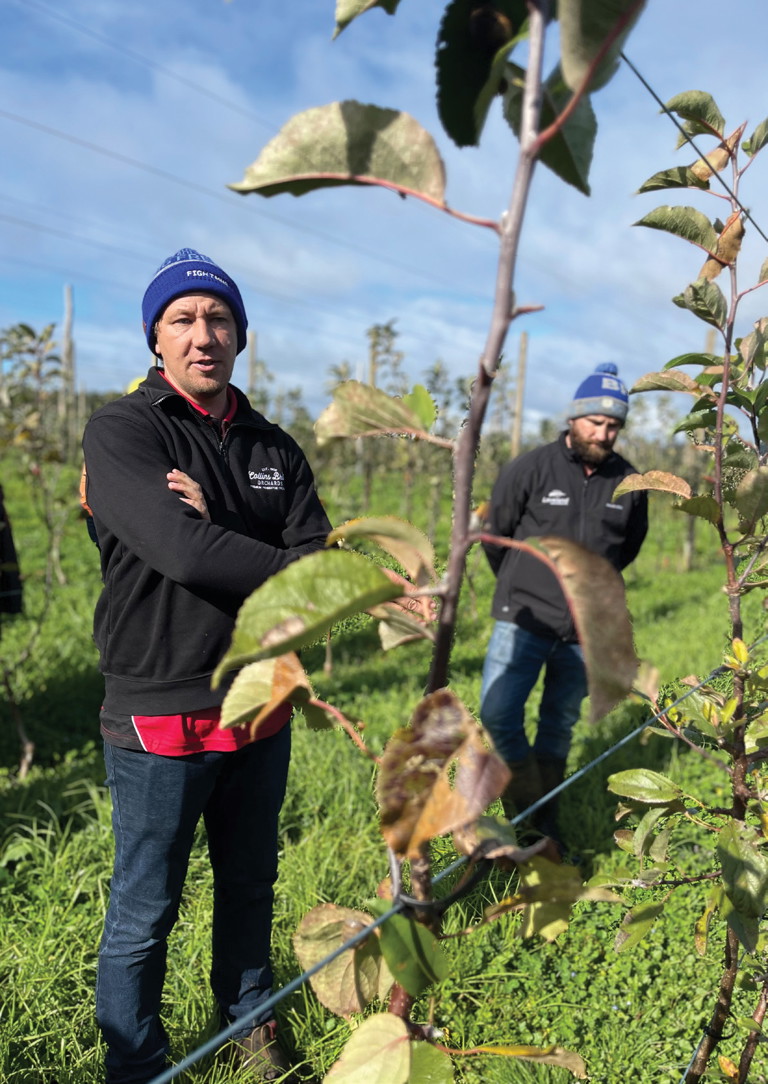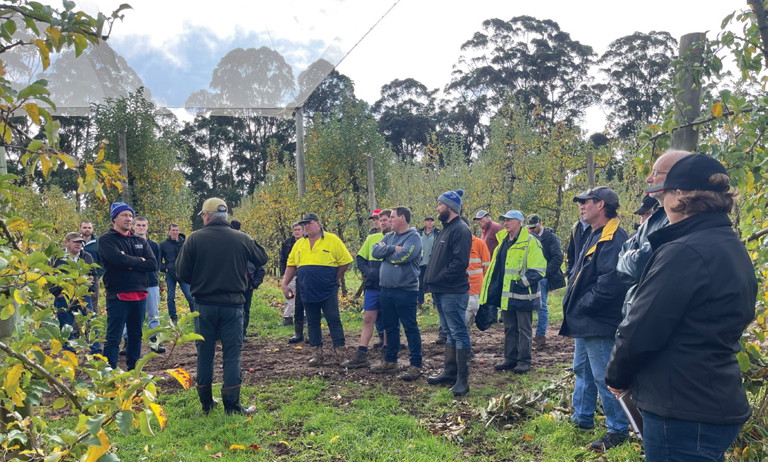
APAL’s Future Orchards ®winter series walk at Collins Bros Orchard, Pemberton.
WA Winter®
APAL Future
Orchard ®Walk
Collins Bros Orchard, Pemberton
HOSTS Murray and Dean Collins.

IN Orchard discussion between Ross Wilson and Murray Collins.

BY SUSIE MURPHY
WHITE
PROJECT MANAGER,
POMEWEST
APAL’s Future Orchards® winter series walk in Western Australia was hosted by Murray and Dean Collins, Collins Bros Orchard in Pemberton, during late June.
It was great morning with over 40 growers enjoying the discussion in the orchard. This was the first time we have had APAL, AgFirst and international guest speakers here in WA since 2019. Our South African pome fruit specialists: Willie Kotze, Horticultural Technical Advisor Pomefruit at Dutoit, Peter Allderman, Pome Fruit Manager — TopFruit and Dr Nigel Cook, Crop Physiologist — Prophyta were able to provide some insight into the challenges faced by the South African pome industry.
Ross Wilson from AgFirst NZ led the in-orchard discussion about crop load management and using bud counts to guide pruning. The technique of counting buds to prune to achieve the target bud number and crop target was demonstrated by Ross and Nigel in a Rosy Glow block, as a way of quantifying the amount of wood to leave on the tree. Some of our younger growers were able to demonstrate bud counting while our older growers were very good at estimating the number of buds.
We visited four blocks, two Rosy Glows, Kanzi and a young twin stem Envy block. Our hosts Murray and Dean Collins were very generous in sharing the successes and challenges they had in each of these blocks and what the goals were for next seasons yield. Collins had invested into picking platforms and their pruning was based around developing a more uniform canopy that was more suited to using platforms for picking.
This led to the discussion around the Community Orchard Group study on the efficiencies of using a platform vs a bag ladder.
Data had been recorded from six orchards this season, there were two systems that led the way in improving labour efficiency: investing into a picking platform but also investing into the Pacific Australia Labour Mobility Scheme (PALM). But where the most gains were was where the orchard had continued with the picking system for a second year improving the labour efficiency even more.
In discussions with Australian growers and our New Zealand and South African guests we learned that growers are facing similar challenges globally, with concerns around labour, variety choices, input costs, returns, changing climate and making decisions on how best to manage these challenges. Nigel and Peter said the challenges faced by South African growers included infrastructure and political uncertainty, defects such as sunburn and internal browning, warm climate effects on chilling and breaking dormancy. New Zealand growers face similar challenges to Australian growers, Ross said, including high costs of production, variety mixes, changing international market dynamics and the cost and availability of labour. While the South African challenges were similar, they also included the infrastructure and political uncertainty, managing the effects of warming climate on winter chilling to break dormancy and sunburn defects.
Thank you to our hosts Murray and Dean Collins for hosting an excellent Orchard Walk and sharing their knowledge and challenges they faced in their orchard.
Spring orchard walk is planned for November. Stay tuned for more information as the season develops.
Ross Wilson from AgFirst NZ led the in-orchard discussion about crop load management.
MORE INFORMATION
Susie Murphy White Front Line Advisor for APAL’s Future Orchards®.